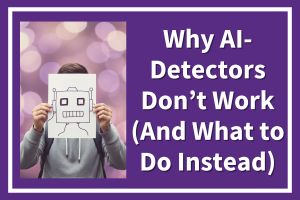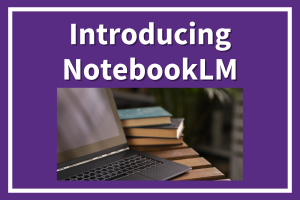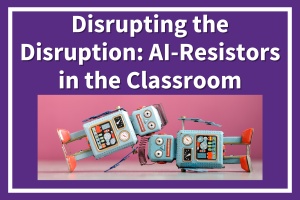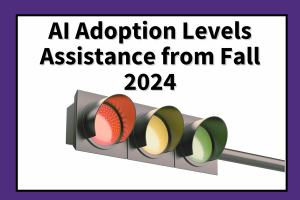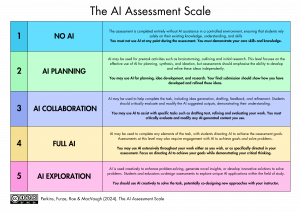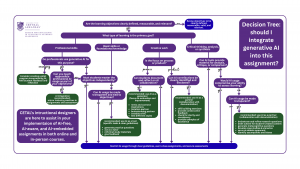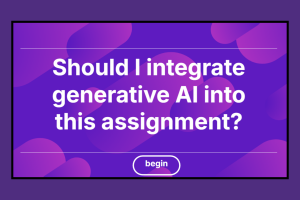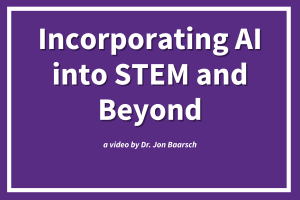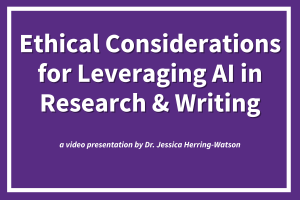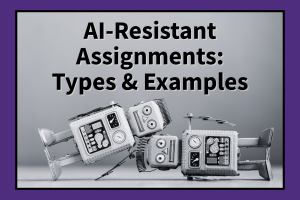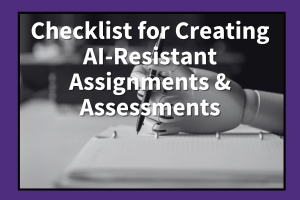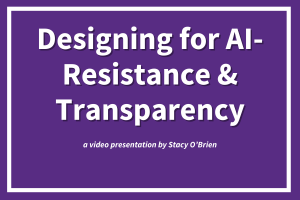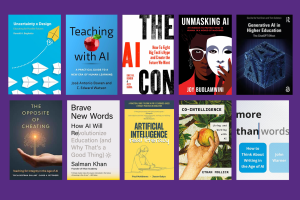Posts on AI from the Teaching Matters @UCA Blog
Creating a Living AI Use Policy for Your Courses
Incorporating AI into Assignments
Making Assignments AI-Resistant
AI Activities for Class Discussion
Metaphors ActivityThis activity facilitates a class discussion about the way we think about, talk about, and use Generative AI.
Ethics ActivitiesThese three activities, created by Abram Anders and Emily Dux Speltz, provide interaction between students, Generative AI, and an instructor in order to understand ethical AI usage.
Data Privacy & Identity ActivityThis activity, created by Jeannie Crowley, was created for students in either computer science courses or liberal arts courses to help them think about the relationship between data, privacy, and identity.
Class Charter CreationThis 30-minute lesson plan, created by Jes Class, is designed to begin a conversation about AI with students and to create a class charter around AI usage.
Critical Thinking SyllabusA six-week framework for lifelong learners to practice sustaining attention and developing cognitive resilience, created by Shae O. Omonijo.
Useful Prompts and Bots
AI in Education Thought Leaders to Follow
Ronald Beghetto, professor of educational psychology at Arizona State University
A critical AI-enthusiast, Beghetto advocates creative, student-centered use of AI while warning of its risks. He promotes “possibility thinking,” critical engagement, and student agency with GenAI tools in education.
Emily Bender, linguist and professor at the University of Washington
An AI-sceptic specializing in computational linguistics, warning of bias and ethical pitfalls in AI language modules. Bender champions critical literacy around automated systems and exposes the ‘hype’ in educational AI.
Timothy Burke, history professor at Swarthmore College
Burke is a cautious critic of AI, focused on the overreliance on writing and assessment models vulnerable to AI-enabled cheating; he sees opportunities if pedagogy is thoughtfully reformed for genuine learning, agency, and creativity.
Graham Clay, AI-E integration consultant; former philosophy professor
Clay actively integrates AI into education, developing workflows and consulting for higher ed. He emphasizes pragmatic adoption–improving efficiency, feedback, and educator support, while building concrete tools.
Laura Dumin, technical writing and composition/rhetoric professor at University of Central Oklahoma
Dumin’s repository of AI information contains her ideas and perspectives on a wide range of topics, including incorporating AI into writing courses and ethical concerns around AI usage.
Leon Furze, education consultant and author
A pragmatist in the AI educational space, Furze researches AI’s impact on writing, consulting globally on ethical, practical, and pedagogical issues. He advocates for thoughtful integration balancing creativity, risk, and responsible innovation.
Ethan Mollick, management professor at the Wharton School of the University of Pennsylvania
Mollick champions ‘co-intelligence’, encouraging educators to experiment, collaborate, and democratize AI in classrooms. He develops interactive tools, with a focus on innovation, accessibility, and transformative pedagogy.
Bonnie Stachowiak, business and management professor at Vanguard University
Stachowiak promotes asset-based, ethical AI use in higher education. Through her podcast and workshops, she encourages curiosity, digital literacy, and equity via generative AI as a coaching and teaching tool.
Annette Vee, English professor at University of Pittsburgh
Vee’s work explores ‘AI-aware curriculum’, digital literacy, and responsible, transparent assignment design. She advises critical, intentional engagement and flexible pedagogy to adapt writing instruction for the AI era.
AI in Education Reading List
Beghetto, R.A. (2024). Uncertainty x Design: Educating for Possible Futures. Cambridge University Press.
Bowen, J. A. & Watson, C. E. (2024). Teaching with AI: a Practical Guide to a New Era of Human Learning. Johns Hopkins University Press.*
Bender, E.M. & Hanna, A. (2025) The AI Con: How to Fight Big Tech’s Hype and Create the Future We Want. Harper.
Buolamwini, Joy (2024) Unmasking AI: My Mission to Protect What Is Human in a World of Machines. Penguin Random House.*
Chan, C.K.Y. & Colloton, T. (2024). Generative AI in Higher Education: The ChatGPT Effect. Routledge.
Gallant, T.B. & Rettinger, D.A. (2025) The Opposite of Cheating: Teaching for Integrity in the Age of AI. University of Oklahoma Press.**
Khan, Salman (2024). Brave New Words: How AI Will Revolutionize Education (and Why That’s a Good Thing). Viking.*
Matthews, P. & Gulya, J. (2025). Artificial Intelligence, Real Literacy. Independently published.*
Mollick, E. (2024) Co-Intelligence: Living and Working with AI. Portfolio.*
Warner, J. (2025) More Than Words: How to Think About Writing in the Age of AI. Basic Books.***
*available in CETAL’s lending library
**CETAL’s fall ’25 book club selection
***CETAL’s spring ’26 book club selection
CETAL Events
AI Mini-Conference, August 12th & 15th, 2025
AI Book Group, Fall 2025 & Spring 2026
Stanford AI for Educators Learning Community, Fall 2025
AI Problems & Practice Learning Community, Fall 2025
AI Community of Practice: AI in the Classroom, Spring 2026

